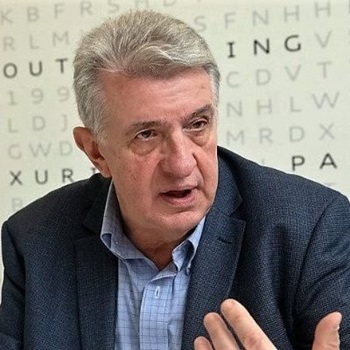Celebrating Bill McBride on his Retirement
 In 2020, SQFI celebrated 25 years. Now in 2021, we celebrate Bill McBride and all his contributions to global food safety and SQFI as he enters into retirement. Bill was there from the beginning, building the SQF Codes focused and designed to help food manufacturing sites to achieve the necessary level of food safety certification. The SQF Codes were launched with version 1 in 1995 and are based on sound science, universally accepted CODEX Alimentarius HACCP Guidelines, ISO 17065 and offer the food sector a way to simultaneously manage food safety and quality.
In 2020, SQFI celebrated 25 years. Now in 2021, we celebrate Bill McBride and all his contributions to global food safety and SQFI as he enters into retirement. Bill was there from the beginning, building the SQF Codes focused and designed to help food manufacturing sites to achieve the necessary level of food safety certification. The SQF Codes were launched with version 1 in 1995 and are based on sound science, universally accepted CODEX Alimentarius HACCP Guidelines, ISO 17065 and offer the food sector a way to simultaneously manage food safety and quality.
Bill helped guide the SQF program in delivering a tool to build confidence and trust between retailers and certified sites, a tool for producers and manufacturers to demonstrate:
• “Due diligence” and compliance with regulatory and product traceability requirements.
• Additional levels of transparency by opting for the SQFI Select Site program.
• An internationally recognized standard, suitable for all food sites operating in domestic and global markets.
• A means to reduce the number and frequency of inconsistent and costly audits.
Bill has always been focused on ensuring SQF certification provides benefit and value, is rigorous yet flexible, and complements government programs and industry initiatives. He has also made sure the program avoids duplication and confusion associated with the current array of industry sector programs. He guided the technical content and auditing process to ensure SQF certification provides independent and external validation that a product, process, or service complies with international, regulatory, and another specified standard (s) and enables a food supplier to give assurances that food has been produced, prepared and handled according to the highest possible standards.
With Bill being a key team member, the SQF Institute has been an active participant in the Global Food Safety Initiative (GFSI) since its inception in 2000 and has been benchmarked since 2005 as conforming to the highest international standards, and protocols recognized by the International Accreditation Forum. The SQF Program has been implemented in over thirty countries around the globe in regions including Asia-Pacific, the Middle East, North America, Europe, South Africa and South America.
FMI purchased the SQF program on September 1, 2003 from the Western Australia Department of Agriculture and established the SQF Institute to manage the program from FMI’s head office in Arlington, Virginia, USA. At the request of its members, FMI acquired the SQF Program so they could utilize one program that met their requirements and provided efficiencies for certified sites. Bill led the ownership transition and advised FMI on SQFI development and growth. The SQFI Team had the pleasure of Bill residing in the Arlington, Virginia office for the initial transition and of course, to teach the team some Aussie greetings each morning.
Bill earned the SQFI Distinguished Service Award in 2015 in recognition of his time and expertise throughout the industry in the area of food safety.
We thank Bill for his many contributions to the program and as we move ahead, SQFI will continue to invest in expanding certified sites in the Asia Pacific Region, and implementing community activities, training, and education.
SQF Contacts starting January 1, 2022
For inquiries and information in ANZ after the 1st January, please contact:
info@sqfi.com for general and technical inquiries.
umme@sqfi.com for local customer service or database inquires.
Recent Blog Posts
SQF Code Edition 10 represents a critical step forward in ensuring rigorous yet practical food safety management across the supply chain.
In an industry where compliance and operational integrity are nonnegotiable, manufacturers and suppliers need more than just certification — they need a globally recognized solution.
Renee McVey is one of the first industry professionals to hold the Safe Quality Food Institute’s new Certified SQF Practitioner credential, which is administered by Exemplar Global.




